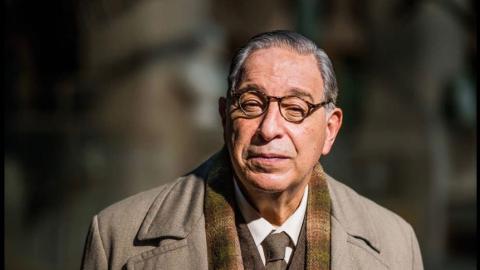
Actor Max McLean Offers Winsome Portrayal of C.S. Lewis in 'The Most Reluctant Convert'
“This story has a remarkable ability to engage audiences regardless of their religious belief. Lewis applied his formidable and self-deprecating wit to engage audiences about his own trying and painful experiences.” The passionate words of Max McLean, who portrays C.S. Lewis on stage and now on screen in the upcoming cinematic release of The Most Reluctant Convert: The Untold Story of C.S. Lewis, also starring Nicholas Ralph of PBS Masterpiece’s "All Creatures Great and Small."
Award-winning actor Max McLean has built an impressive dossier. Also founder and artistic director of New York City-based Fellowship for Performing Arts, Max McLean’s FPA produces theatre and film from a Christian worldview meant to engage diverse audiences.
Viewers familiar with literary works by C.S. Lewis will recognize Max’s stage performances. Max has created the roles of Screwtape (New York, London, national tour), C.S. Lewis in "The Most Reluctant Convert" (New York, national tour) and Mark in "Mark’s Gospel" for which he received a Jeff Award – Chicago theatre’s highest honor.
I spoke with Max recently about this one-night-only special event, how he relates to C.S. Lewis, and his take on Christian faith in media.
One of the most charming aspects of the conversation I had with Max was whenever I asked a question about Lewis, he slipped into his Lewis-esque accent to become the character, seemingly without effort and with the comfort one would have conversing with an old friend.
Perhaps that is what draws you in to this caricature – the bond between Max and Lewis flows with familiarity which welcomes viewers into the relationship. In The Most Reluctant Convert: The Untold Story of C.S. Lewis, as other actors inhabit two other different ages of Lewis, Max becomes the omnipresent narrator, inviting us to join along as he not only explains the facts of the past but also reflects on events which moved Lewis from atheist, to theist, until he finally “admitted that God was God, knelt and prayed, perhaps the most dejected, reluctant convert in all England.”
Just to get to know you a little bit better, what first sparked your connection with C.S. Lewis?
Well, I'm an adult convert to Christianity in my twenties. Somebody gave me his books because he also was an adult convert at 32. And we became instant friends. You know, I think of Lewis as kind of a bridge from the postmodern world that we're in and the world we're educated in, which is, you know, very much about the here and now. It's pretty much enlightenment values – not much about the hereafter. You can't really trust any kind of doctrinal statements about the supernatural, whether they be Christian or Jewish or anything else. And Lewis really captured my imagination. He became my spiritual guide. He really understands the spiritual warfare that attracted me to 'The Screwtape Letters' and it also attracted me to 'The Great Divorce.'
Both of those are very personal in that they're, fictionalized versions of his unexperienced emotional experiences – psychological experience of what kept him from moving forward in Christ. You know, with Screwtape he was talking about spiritual warfare from the demon’s point of view and, and how temptation keeps us from moving forward and in 'The Great Divorce,' he's talking about it from a sort of heavenly point of view, how we resist the holy spirit and kind of just stay put. Both of those made me want to go back to his own conversion story. And that led me to Surprised by Joy, which became the basis for the play we wrote that ran in New York for 15 weeks and toured around the country for a long time, and then ultimately became this movie.
Then, were you established in the acting world before you discovered your faith?
Not established, but I was going to try to make a career of it.
So how did that change how you chose projects and how did that guide your career?
That's a good question because since I was an adult convert, I didn't get the memo that Christians weren't supposed to be actors! I realized the medium was such a powerful medium in terms of really articulating world view, capturing people's imaginations. And I was curious why it wasn't being done much from a Christian worldview, And so I thought, well, why don't I do it? Why not use the skills and techniques developed in the theater and apply it to presenting the Bible and other works of Christian literature? That attracted me to Lewis. We have a production company and our mission is to produce theater and film from a Christian worldview meant to engage a diverse audience.
We are very careful in terms of the material we select that we think can art can speak to an intellectually diverse or religiously diverse audience. I mean, right now diversity of gender and race are about the only ones you could talk about, but it's more than that. We want to find out what material could articulate that, and then we want to execute it to the highest levels that our budgets will allow, so we can play great venues and produce works like The Most Reluctant Convert: The Untold Story of C.S. Lewis.
And that's the Fellowship for Performing Arts where I just saw you were in Tulsa performing? It was quite a large arena.
Yes, we're on tour right now with The Great Divorce. So we've been Colorado Springs, Kansas city, LA San Francisco, Phoenix, Tulsa, this week, we're in Oklahoma city. The shows – they attract audiences. And so this movie, by the way, we're really pleased. Tickets sales are going very well.
How involved were you in the writing and the production of the film The Most Reluctant Convert?
The film adaptation follows very closely with the stage adaptation, but the film expands it. With the stage version, it’s just a one-person play, but the film version – we have 17 actors, 190 extras, 270 costumes, 18 different locations in and around Oxford. So it really opens it up.
Oxford is just beautiful and being there helps to convey the feeling that that viewers are there with C.S. Lewis.
It's pretty magical. The ‘dreaming spires’ of Oxford…
I'm curious about the decision to include the behind-the-scenes establishing shot and closing shot.
Oh, that was that was totally the director's vision. I mean, I think it's – because the film breaks the fourth wall right away, it's a way – I mean, I really didn't talk to Norman too much about it – but seeing the film, it sort of prepares the way for what's to come. I'm telling the story directly to you. I break the fourth wall and that's always pretty risky.
Those first few minutes kind of settle the audience into the story. And this feels like you begin by thanking me for joining you. I was just so impressed with the whole production.
Oh, that's great. That's super good. You know, what's funny is, you start, ‘Where's my phone and how's my hair?’ I mean, all that silly stuff, Lewis wouldn’t have been concerned with either one.
What do you think he would think about seeing himself portrayed on screen?
You know, Lewis is very complex that way. He wrote thousands and thousands of letters and he kept them and so much of his writings seem to have a sense that they were going to be read. His audience was wider than just himself.
I don't think he knew he would be famous. I mean, he was famous in his own day. He didn't particularly like it though. He didn't have a big personality. There's some sort of prescience that what he wrote for one person in a letter may be helpful to many others.
That's true. And there's something in creating this film and adding to the legacy of evangelism through those works. Do you see yourself doing another project of this scale with C.S. Lewis’s works?
I'd like to. So much of it is rights issues, but I would definitely love to tackle Lewis again. Absolutely.
That would be fantastic. Tell me, what was your best day on set?
Well, you know, I loved – we spent three days at Magdalen College, and one of those days was inside the Magdalen College Library, which was built around 1470. And you could just feel the wisdom that has been in that room. It wasn't, you know, huge by any means, but you were in a room that influenced so many people before you. Also, Addison's Walk where Lewis and Tolkien had their famous conversation about Jesus – that he was the myth in which all other myths point, the true myth behind all myths. And it was that conversation that moved Lewis to take the Bible more seriously and reading the gospels more closely because he saw Jesus now as a hero. But of course he said the difference being, there's all these myths of dying gods and talking kind of challenged him.
He said that if you meet a dying God in a myth of a dying God, like Osiris or Baldr or Dionysus, you like it very much. Except when you meet it in the gospels. And that's because he thought the gospels were pre-scripted. He said, the story of Christ is a myth just like these other myths with one tremendous difference. It really happened. And that woke Lewis up. He all of a sudden started taking Jesus very seriously. He became a believer in God. And in theism, he said his religion was something like that of the Jews until he started to come to terms with who Jesus was.
Click here for more information and to purchase tickets for the Nov. 3 cinematic event for The Most Reluctant Convert: The Untold Story of C.S. Lewis and take a look at the trailer below:



